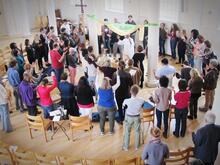Holding Grief and Tenderness Together—Together
In August 2021, I returned to Yale Divinity School after more than a year, a brutal pandemic year, and now entered a place that was both familiar and foreign. Walking onto the campus for the first time since March 2020, I entered beloved Marquand Chapel, where I found that time was standing still. Pictures of classmates adorned the walls, along with faded construction paper on bulletin boards from past services and stacks of bulletins of worship services that were used right before we entered lockdown.
And here I was, standing in the middle of the chapel, now tasked with the enormous and heavy responsibility to form and re-form worship in this Divinity School community. Never in a lifetime did I think I would find myself in this place, in this work, and yet here I stood, called to the unknown.
We had to investigate our remembering—and work at re-membering, the effort to repair and renew and reconnect.
Never expected to be here, but here I am.
This statement has managed to sum up my experience over the last two years. I suspect it might ring true for others as we have collectively endured this pandemic:
We never expected to be here, but here we are.
Here we are, living through a transformative time, a traumatic time. And somehow, some way, we need to find a path forward. We must be ready to embrace the new normal, we’re told. Somehow we must keep moving along.
We never expected to be here, but here we are.
In this third year of the pandemic, faced with the questions of how to press on, and how to find a way to gently pastor and prepare our communities for what lies ahead, I’ve wondered how anyone could possibly respond to the challenge adequately.
False Starts
I initially started writing this reflection with the intention of focusing on grief, highlighting the ways that we need to be able to grieve with one another. I wanted to write about how our eagerness to quickly move on threatens to undercut the necessity that we mourn the losses we’ve sustained. I wanted to dive deep into the traumas that we’ve experienced—loss of graduations, goodbyes, family members, friends. I wanted to speak of the need for lament in a society that has failed to mourn in spite of the hard fact that we will be unpacking this trauma for decades to come. That said, I admit, the toughest part of writing through grief is the danger of not getting out of grief. So here we are.
At the beginning of the school year, shortly after I was hired, Dean of Chapel Awet Andemicael asked me what sort of vision we wanted to set forth for the chapel in the coming semesters. We recognized this would, in many ways, be a reset. So many of our students, having arrived at YDS during the pandemic, had never experienced worship together in the chapel. And those who did had only a semester and a half’s amount of institutional memory to rely on. So the opportunity was ripe for things to change and start anew. At first, we were excited about this— yes, let’s change things up!
Investigating Our Memories
However, in our conversations, we found ourselves returning to this idea: “remember/re-member our belonging.” It became clear to us that the way forward actually required us to look back. We had to investigate our memories, the moments when we felt connected, bound to one another in our experiences, our faith, and in the deep commandment and commitment that we belong to each other and to the Divine. It also meant the work of re-membering, the effort to repair and renew and reconnect.
It’s an understatement to say that this is a huge responsibility. The weight of this work is not lost on me. Over the last year, as I’ve learned to embrace my role, I’ve often wondered: If I’m feeling this grief and exhaustion, then surely students must be feeling it too. How in God’s name am I going to do this? How will we help foster worship that speaks to the tenderness, exhaustion, and grief that continue to envelop us?
Season of Epiphanies
These questions occupy my mind more days out of the week than not. Sometimes, they take up space during chapel services. In my head, I’ll take a deep breath and look back on my time at YDS as a student, and what regular worship at Marquand Chapel meant to me and my classmates those years ago. I worry that what’s happening now may not be meeting the community where it needs to be, that it’s not filling the grief and exhaustion that so sit in my own being and perhaps in theirs. And so I escape, resting in the nostalgia for a few moments longer, before snapping out of it. No, the pathway we are trying to take now cannot be what it was before 2020.
After those moments pass, I look up and my gaze will rest on the dozens of people in the chapel. I see the students appointed to preach from the podium, remembering who they were when they first entered school, now looking resolute in this crisis and committed to the work of re-membrance. I sit in awe of how deftly and gently this community continues to hold one another’s fragilities, as students lament, praise, and grieve through their songs, words, and prayers, binding themselves to the very core of the gathering, prophetically reminding the congregation that we are each other’s keepers, and we are also God’s own.
And in that split-second recognition, I exhale.
We never expected to be here, but here we are,
Holding one another in all of our fragility, tenderness, and love,
Remembering our belonging.
Re-membering our belonging.
Michael Libunao-Macalintal ’20 M.Div. is Liturgical Minister and Chapel Communications Manager for Marquand Chapel at YDS.

